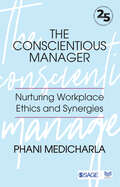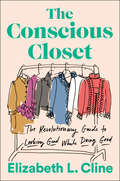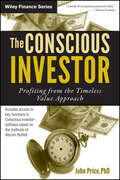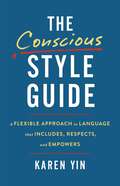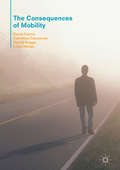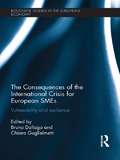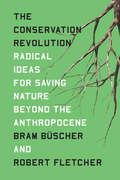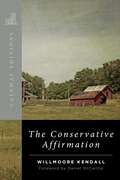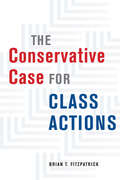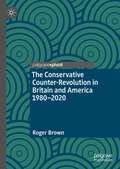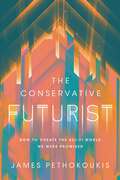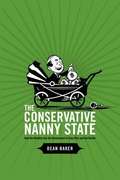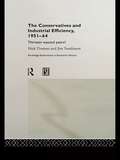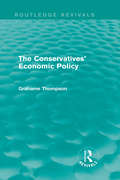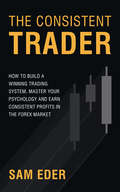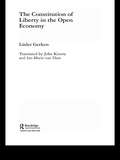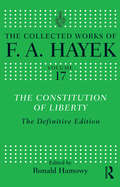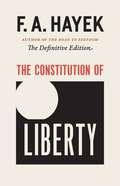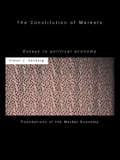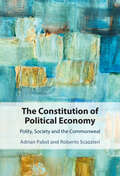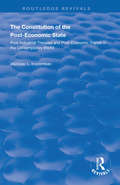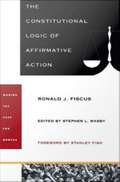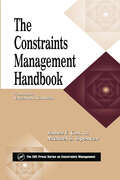- Table View
- List View
The Conscientious Manager: Nurturing Workplace Ethics and Synergies
by Bala Phani Chand MedicharlaAt the core of innovation and growth in any organization lies a driven and motivated team player who needs to be constantly nurtured and ennobled with a great value system and workplace ethics. The Conscientious Manager brings out several dimensions of workplace dynamics through powerful storytelling to help promote a sense of belongingness and synergy in the workplace. The themes portrayed in the book are based on diversity, facing disruptions, ownership and accountability, importance of genuine feedback, learning from experts, mentoring, professional gratitude and others. By offering the readers a holistic learning experience of workplace morals and dilemmas such as personal, interpersonal, cultural and leadership, the book prepares them to face the workplace with empathy, respect, commitment and confidence.
The Conscious Closet: The Revolutionary Guide to Looking Good While Doing Good
by Elizabeth L. ClineFrom journalist, fashionista, and clothing resale expert Elizabeth L. Cline, “the Michael Pollan of fashion,”* comes the definitive guide to building an ethical, sustainable wardrobe you'll love.Clothing is one of the most personal expressions of who we are. In her landmark investigation Overdressed: The Shockingly High Cost of Cheap Fashion, Elizabeth L. Cline first revealed fast fashion’s hidden toll on the environment, garment workers, and even our own satisfaction with our clothes. The Conscious Closet shows exactly what we can do about it. Whether your goal is to build an effortless capsule wardrobe, keep up with trends without harming the environment, buy better quality, seek out ethical brands, or all of the above, The Conscious Closet is packed with the vital tools you need. Elizabeth delves into fresh research on fashion’s impacts and shows how we can leverage our everyday fashion choices to change the world through style. Inspired by her own revelatory journey getting off the fast-fashion treadmill, Elizabeth shares exactly how to build a more ethical wardrobe, starting with a mindful closet clean-out and donating, swapping, or selling the clothes you don't love to make way for the closet of your dreams. The Conscious Closet is not just a style guide. It is a call to action to transform one of the most polluting industries on earth—fashion—into a force for good. Readers will learn where our clothes are made and how they’re made, before connecting to a global and impassioned community of stylish fashion revolutionaries. In The Conscious Closet, Elizabeth shows us how we can start to truly love and understand our clothes again—without sacrificing the environment, our morals, or our style in the process.*Michelle Goldberg, Newsweek/The Daily Beast
The Conscious Investor: Profiting from the Timeless Value Approach (Wiley Finance #586)
by John PriceAn intriguing look at the full range of value methods brought together for the first time The biggest block to success in the stock market is unconscious investing, or following the crowd without asking the right questions such as: "What is it really worth?" Even more fundamental is: "What rate of return can I confidently expect to get?" Without having the methods to answer these questions is like trying to sail a boat without a rudder. The Conscious Investor covers each of the main methods used to calculate value or return in the stock market, along with descriptions of how and when to use them, as well as their strengths and weaknesses. Interspersed throughout the methods are the timeless investment principles of Benjamin Graham and Warren Buffett. The book: Includes balance sheet methods, dividend discount methods, discounted cash flow methods, price ratio methods, and many others Explains the significance of viewing real value as a combination of a stock's price or market value and its intrinsic value Comes with free access to key functions in the author's Conscious Investor software The Conscious Investor is indispensable reading for everyone with an interest in investing in the stock market, from novices to experienced professionals. Using this book as your guide, you'll quickly discover what it takes to be a conscious investor and gain more confidence in knowing what and when to buy, when to hold, and when to sell.
The Conscious Style Guide: A Flexible Approach to Language That Includes, Respects, and Empowers
by Karen YinA timeless, indispensable guide for anyone who wants to communicate with sensitivity and compassion. Most of us want to choose inclusive, respectful, and empowering language. But language—and how we use it—continually evolves, along with cultural norms. When contradictory opinions muddle our purpose, how do we align our word choices with our beliefs? Who has the final say when people disagree? And why is it so hard to let go of certain words? Afraid of getting something wrong or offending, we too often treat words as dos or don&’ts, regardless of context and nuance. Thankfully, in The Conscious Style Guide, award-winning editor Karen Yin provides a road map for writing and speaking with equity in mind—no matter how the world around us changes. Readers will learn: How to identify biased language How to use inclusive language to bring attention to specific groups of people How to adopt conscious language as a tool for self-awareness and critical thinking How to make digital materials more accessible, from event flyers to websites How to alleviate the stress of experiencing exclusionary language How to collaborate with others and work across differences How to create a style sheet to help support your practice And much more With practical advice and hundreds of relatable examples, The Conscious Style Guide invites us to challenge binary thinking, embrace flexibility and creativity, and explore truly effective communication—in all aspects of our lives.
The Consequences of Mobility
by David Cairns Daniel Briggs Valentina Cuzzocrea Luísa VelosoThis book explores various forms of highly skilled mobility in the European Union, assessing the potential for this movement to contribute to individual and societal development. In doing so, the authors illustrate some of the issues arising from the opening up of Europe's borders, and exposing its education systems and labour markets to international competition. While acknowledging the potentially positive aspects of mobility, they also reveal many of the negative consequences arising from flaws in mobility governance and inequalities in access to opportunities, arguing that when the management of mobility goes 'wrong', we are left with a heightened level of precariousness and the reproduction of social inequality. This discussion will be of interest to those working within Europe's mobility infrastructure, as well as policymakers in the mobility field and students and scholars from across the social sciences.
The Consequences of the International Crisis for European SMEs: Vulnerability and Resilience (Routledge Studies in the European Economy)
by Bruno Dallago Chiara GuglielmettiThe book explores how, to what extent and with what consequences the international crisis of 2007-2008 and the recession which followed have affected European SMEs (small and medium enterprises) in both the well established market economies of the old member countries and in the post-transformation new member countries, and what can be done at the institutional and political level to uphold them.
The Conservation Revolution: Radical Ideas for Saving Nature Beyond the Anthropocene
by Robert Fletcher Bram BuscherA post-capitalist manifesto for conservationConservation needs a revolution. This is the only way it can contribute to the drastic transformations needed to come to a truly sustainable model of development. The good news is that conservation is ready for revolution. Heated debates about the rise of the Anthropocene and the current &‘sixth extinction&’ crisis demonstrate an urgent need and desire to move beyond mainstream approaches. Yet the conservation community is deeply divided over where to go from here. Some want to place &‘half earth&’ into protected areas. Others want to move away from parks to focus on unexpected and &‘new&’ natures. Many believe conservation requires full integration into capitalist production processes. Building a razor-sharp critique of current conservation proposals and their contradictions, Büscher and Fletcher argue that the Anthropocene challenge demands something bigger, better and bolder. Something truly revolutionary. They propose convivial conservation as the way forward. This approach goes beyond protected areas and faith in markets to incorporate the needs of humans and nonhumans within integrated and just landscapes. Theoretically astute and practically relevant, The Conservation Revolution offers a manifesto for conservation in the twenty-first century—a clarion call that cannot be ignored.
The Conservative Affirmation
by Willmoore KendallMaverick political scientist Willmoore Kendall predicted the triumph of conservatism. Upon the 1963 publication of Kendall's The Conservative Affirmation, his former Yale student William F. Buckley, Jr. called him "one of the most superb and original political analysts of the 20th century," but even Buckley shook his head at what appeared to be Kendall's "baffling optimism." During the 60's, Kendall stood apart from the mainstream conservative movement which he accused of being anti-populist and of "storming American public opinion from without" by wrongly assuming that the American people were essentially corrupt and "always ready to sell their votes to the highest bidder." Kendall believed that Americans would come to actively realize the conservatism which they had always actually lived.
The Conservative Case for Class Actions
by Brian T. FitzpatrickSince the 1960s, the class action lawsuit has been a powerful tool for holding businesses accountable. Yet years of attacks by corporate America and unfavorable rulings by the Supreme Court have left its future uncertain. In this book, Brian T. Fitzpatrick makes the case for the importance of class action litigation from a surprising political perspective: an unabashedly conservative point of view. Conservatives have opposed class actions in recent years, but Fitzpatrick argues that they should see such litigation not as a danger to the economy, but as a form of private enforcement of the law. He starts from the premise that all of us, conservatives and libertarians included, believe that markets need at least some rules to thrive, from laws that enforce contracts to laws that prevent companies from committing fraud. He also reminds us that conservatives consider the private sector to be superior to the government in most areas. And the relatively little-discussed intersection of those two beliefs is where the benefits of class action lawsuits become clear: when corporations commit misdeeds, class action lawsuits enlist the private sector to intervene, resulting in a smaller role for the government, lower taxes, and, ultimately, more effective solutions. Offering a novel argument that will surprise partisans on all sides, The Conservative Case for Class Actions is sure to breathe new life into this long-running debate.
The Conservative Counter-Revolution in Britain and America 1980-2020
by Roger BrownThis book assesses the impacts of the right within the US and UK, forty years on from their initial effects upon economic and social orthodoxies. It argues that one way of understanding the main developments in the political economies of the major Anglophone countries during these decades is to see them as a conservative reaction to the New Deal and the Welfare State, and the associated growth in state intervention, expenditure and regulation. The recent rise in ‘authoritarian populism’ can be seen as a popular response to the policies associated with this reaction, the response being exploited by populist demagogues like Donald Trump, Boris Johnson and Marine Le Pen. Written in a lively and engaging manner, this book will be of interest to academics and students in politics, economics, sociology and contemporary history, as well as general readers.
The Conservative Futurist: How to Create the Sci-Fi World We Were Promised
by James PethokoukisDiscover the surprising case for how conservatism can help us achieve the epic sci-fi future we were promised. America was once the world&’s dream factory. We turned imagination into reality, from curing polio to landing on the Moon to creating the internet. And we were confident that more wonders lay just over the horizon: clean and infinite energy, a cure for cancer, computers and robots as humanity&’s great helpers, and space colonies. (Also, of course, flying cars.) Science fiction, from The Jetsons to Star Trek, would become fact. But as we moved into the late 20th century, we grew cautious, even cynical, about what the future held and our ability to shape it. Too many of us saw only the threats from rapid change. The year 2023 marks the 50th anniversary of the start of the Great Downshift in technological progress and economic growth, followed by decades of economic stagnation, downsized dreams, and a popular culture fixated on catastrophe: AI that will take all our jobs if it doesn&’t kill us first, nuclear war, climate chaos, plague and the zombie apocalypse. We are now at risk of another half-century of making the same mistakes and pushing a pro-progress future into the realm of impossibility. But American Enterprise Institute (AEI) economic policy expert and long-time CNBC contributor James Pethokoukis argues that there&’s still hope. We can absolutely turn things around—if we the people choose to dream and act. How dare we delay or fail to deliver for ourselves and our children. With groundbreaking ideas and sharp analysis, Pethokoukis provides a detailed roadmap to a fantastic future filled with incredible progress and prosperity that is both optimistic and realistic. Through an exploration of culture, economics, and history, The Conservative Futurist tells the fascinating story of what went wrong in the past and what we need to do today to finally get it right. Using the latest economic research and policy analysis, as well as insights from top economists, historians, and technologists, Pethokoukis reveals that the failed futuristic visions of the past were totally possible. And they still are. If America is to fully recover from the COVID-19 pandemic, take full advantage of emerging tech from generative AI to CRISPR to reusable rockets, and launch itself into a shining tomorrow, it must again become a fully risk-taking, future-oriented society. It&’s time for America to embrace the future confidently, act boldly, and take that giant leap forward.
The Conservative Nanny State: How the Wealthy Use the Government to Stay Rich and Get Richer
by Dean BakerEconomist Dean Baker debunks the myth that conservatives favor the market over government intervention. In fact, conservatives rely on a range of "nanny state" policies that ensure the rich get richer while leaving most Americans worse off. It's time for the rules to change. Sound economic policy should harness the market in ways that produce desirable social outcomes -- decent wages, good jobs and affordable health care. Dean Baker is co-director of the Center for Economic and Policy Research.
The Conservatives and Industrial Efficiency, 1951-1964: Thirteen Wasted Years? (Routledge Explorations in Economic History)
by Jim Tomlinson Nick TiratsooThe Conservatives and Industrial Efficiency, 1951-1964 responds to the need for a full assessment of the Conservatives performance in this crucial period. Drawing upon a wide range of archival sources, Nick Tiratsoo and Jim Tomlinson explore the different aspects of the efficiency question. Beginning with the major issue of attempts in the 1950s to americanize British industry, the authors also discuss the Conservatives policy on ompetition, education and training, investment and research and development. This new survey reveals that the Conservatives were informed about each of these issues, yet shrank from effective reform. They were, rather, reduced to inertia by ideological dilemmas, internal party antagonisms and conflicting strategic objectives. Tiratsoo and Tomlinson conclude that 1951 - 1964 were indeed 'thirteen wasted years'. This book will be of interest to all those concerned with the post-1945 economic and political history of Britain.
The Conservatives' Economic Policy (Routledge Revivals)
by Grahame ThompsonWhat happened to economic policy during the first five years of Mrs Thatcher’s government? Most commentators have emphasised the radical changes wrought in economic theory and policy over the period from 1979. The left saw this as heralding the introduction of the social market economy and authoritarian populism, the right saw it as evangelical monetarism and a new beginning. This book, first published in 1986, challenges the notion that there was a revolution in economic policy making. It emphasises the constraints on economic policy formation and the ironies that these have thrown up with respect to the Conservatives’ attempts at changing the course of the economy. The book argues that the Thatcher government had not been able to implement a great deal of its rhetoric. This book is ideal for students of economics and politics.
The Consistent Trader: How to Build a Winning Trading System, Master Your Psychology and Earn Consistent Profits in the Forex Market
by Sam EderThe creator of the acclaimed Forex Course for Smart Traders shows you how to trade smarter than Wall Street and quants. Most traders learn to trade the wrong way, and realize only years later that their trading system has been focused on all the wrong things. You can save yourself countless hours and dollars by learning to trade Forex based on the principles and practices of history&’s greatest traders. Discover what works and what doesn&’t. It&’s doing the simple things well that will yield the best results in trading. If you fail to master the fundamentals of successful trading, you are virtually guaranteed to fail long-term because of poor risk management. In this book you&’ll learn: · The 25 beliefs of highly successful traders and how to model them · The scientific path to financial freedom using a trading system that creates consistent profits again and again · How to develop a working model of the forex market that allows you to spot opportunities and avoid mistakes · How to get an edge and trade like the &“house&” without an algorithm or inside information · How to set simple objectives that let you risk less and win big more often · How to run your trading business like a hedge fund · The one secret the world&’s top trading psychologist recommends · How to balance your trader, analyst, and risk manager roles · The 12 daily tasks of top Forex traders · How to get in the trading zone like an elite athlete
The Constant Contact Guide to Email Marketing
by Eric GrovesThe leading email marketing firm shows you how to create high-impact, low-cost campaigns Email marketing is an incredibly cost-effective way to establish and build relationships that drive business success. But, it can also be a challenge because the inbox is a hostile environment. Whether your email is noteworthy--or an annoying waste of your customer's time--depends on your ability to stick to stick the fundamentals of good marketing and authentic relationship building. The Constant Contact Guide to Email Marketing presents best practices and relationship-building principles from America's leading email marketing firm. With over 280,000 small business and non-profit clients, Constant Contact is constantly testing and learning what works and what doesn't, and it's all here. There's no other email guide on the market that provides this level of comprehensive, practical guidance. Whether you're starting your own small business or need to grow on a shoestring budget, this book will get you up to speed fast. Learn about: Ten email pitfalls that will get your business into trouble Ten things your customers expect you to do The "soft" benefits of email marketing Using email in combination with other marketing efforts How four types of permissions can make or break your strategy Building an email list that is valuable and effective Creating valuable content Choosing an effective, professional email format Ensuring your emails are delivered, opened, and read With The Constant Contact Guide to Email Marketing, you'll learn to avoid the common mistakes of email marketing, give your customers content they love, and combine an effective email marketing strategy with your traditional marketing efforts--giving you way more bang for your marketing buck.
The Constant Economy: How to Create a Stable Society
by Zac GoldsmithA timely, inspiring manifesto combining the power of markets with the will of people to effect change for the ultimate survival of the planet Since the industrial revolution, the economies of developed nations have grown at the expense of the natural world, but the earth's resources are finite, climate change threatens to dramatically transform how and where people live, and the global economic system is in disarray. Offering an urgently needed alternative model, this book argues for the creation of a "constant economy," in which resources are valued not wasted, food is grown sustainably, and goods are built to last. The constant economy operates at the human scale, and above all it recognizes nature's limits. This book explains that almost every action needed to support the environment is already being carried out somewhere in the world, by companies, communities, and governments determined to blaze a trail. Where they have done the right thing, their customers and voters have rewarded them. Practical solutions exist, and they are brought together and set out in this groundbreaking book.
The Constitution of Liberty in the Open Economy (Routledge Foundations Of The Market Economy Ser.)
by Luder GerkenIn these heady days of ever increasing globalization it has become vital to question whether governments should be allowed to protect domestic enterprises from foreign competitors.This book represents a first attempt to provide a new conceptual basis for discussing the cases in which free trade should be the option of choice in trade policy and tho
The Constitution of Liberty: The Definitive Edition (The Collected Works of F.A. Hayek #17)
by F.A. HayekOriginally published in 1960, The Constitution of Liberty delineates and defends the principles of a free society and traces the origin, rise, and decline of the rule of law. Casting a skeptical eye on the growth of the welfare state, Hayek examines the challenges to freedom posed by an ever expanding government as well as its corrosive effect on the creation, preservation, and utilization of knowledge. In distinction to those who confidently call for the state to play a greater role in society, Hayek puts forward a nuanced argument for prudence. Guided by this quality, he elegantly demonstrates that a free market system in a democratic polity—under the rule of law and with strong constitutional protections of individual rights—represents the best chance for the continuing existence of liberty. Striking a balance between skepticism and hope, Hayek’s profound insights remain strikingly vital half a century on. This definitive edition of The Constitution of Liberty will give a new generation the opportunity to learn from Hayek’s enduring wisdom.
The Constitution of Liberty: The Definitive Edition (The\collected Works Of F. A. Hayek Ser. #17)
by F.A. A. Hayek“One of the great political works of our time . . . The twentieth-century successor to John Stuart Mill’s essay ‘On Liberty.’” —NewsweekConservatives and concerned citizens alike have grown increasingly fearful of big government. Enter Nobel Prize–winning economist and political theorist F. A. Hayek, whose passionate warning against empowering states with greater economic control, The Road to Serfdom, became an overnight sensation.The latest entry in the University of Chicago Press’s series of newly edited editions of Hayek’s works, The Constitution of Liberty is, like Serfdom, just as relevant to our present moment. The book is considered Hayek’s classic statement on the ideals of freedom and liberty, ideals that he believes have guided—and must continue to guide—the growth of Western civilization. Here Hayek defends the principles of a free society, casting a skeptical eye on the growth of the welfare state and examining the challenges to freedom posed by an ever expanding government—as well as its corrosive effect on the creation, preservation, and utilization of knowledge. In opposition to those who call for the state to play a greater role in society, Hayek puts forward a nuanced argument for prudence. Guided by this quality, he elegantly demonstrates that a free market system in a democratic polity—under the rule of law and with strong constitutional protections of individual rights—represents the best chance for the continuing existence of liberty.Striking a balance between skepticism and hope, Hayek’s profound insights are timelier and more welcome than ever before. This definitive edition of The Constitution of Liberty will give a new generation the opportunity to learn from his enduring wisdom.
The Constitution of Markets: Essays in Political Economy (Foundations Of The Market Economy Ser.)
by Viktor J VanbergWhat is the nature and role of competition in markets and politics?This book examines the institutional dimension of markets and the rules and institutions that condition the operation of market economies. Particular attention is paid to the the role of the state, specifically the role of governments in shaping and maintaining the economic constitu
The Constitution of Political Economy: Polity, Society and the Commonweal
by Adrian Pabst Roberto ScazzieriThe two dominant conceptions of political economy are based on either reducing political decisions to rational-choice reasoning or, conversely, reducing economic structures and phenomena to the realm of politics. In this book, Adrian Pabst and Roberto Scazzieri contend that neither conception is convincing and argue for a fundamental rethinking of political economy. Developing a new approach at the interface of economic theory and political thought, the book shows that political economy covers a plurality of dimensions, which reflect internal hierarchies and multiple relationships within the economic and political sphere. The Constitution of Political Economy presents a new, richer conception of political economy that draws on a range of thinkers from the history of political economy, recognising the complex embedding of the economy and the polity in society. Effective policy-making has to reflect this embedding and rests on the interdependence between local, national, and international actors to address multiple systemic crises.
The Constitution of the Post-Economic State: Post-Industrial Theories and Post-Economic Trends in the Contemporary World (Routledge Revivals)
by Vladislav L. InozemtsevFirst published in 1998, this author illustrates clearly how, on the threshold of the new millennium, the world is entering a post-economic era. On the basis of a comprehensive analysis of modern socio-economic trends, the author brings forward a new paradigm for understanding contemporary economic processes that change the substance of our civilization.
The Constitutional Logic of Affirmative Action
by Ronald J. FiscusFew issues are as mired in rhetoric and controversy as affirmative action. This is certainly no less true now as when Ronald J. Fiscus's The Constitutional Logic of Affirmative Action was first published in 1992. The controversy has, perhaps, become more charged over the past few years. With this compelling and rigorously reasoned argument for a constitutional rationale of affirmative action, Fiscus clarifies the moral and legal ramifications of this complex subject and presents an important view in the context of the ongoing debate. Beginning with a distinction drawn between principles of compensatory and distributive justice, Fiscus argues that the former, although often the basis for judgments made in individual discrimination cases, cannot sufficiently justify broad programs of affirmative action. Only a theory of distributive justice, one that assumes minorities have a right to what they would have gained proportionally in a nonracist society, can persuasively provide that justification. On this basis, the author argues in favor of proportional racial quotas--and challenges the charge of "reverse discrimination" raised in protest in the name of the "innocent victims" of affirmative action--as an action necessary to approach the goals of fairness and equality. The Constitutional Logic of Affirmative Action focuses on Supreme Court affirmative action rulings from Bakke (1976) to Croson (1989) and includes an epilogue by editor Stephen L. Wasby that considers developments through 1995. General readers concerned with racial justice, affirmative action, and public policy, as well as legal specialists and constitutional scholars will find Fiscus's argument passionate, balanced, and persuasive.
The Constraints Management Handbook (The CRC Press Series on Constraints Management)
by Michael S. Spencer III CoxA new approach to improving the production of goods and services, Constraints Management (CM), recognizes the powerful role of the constraint (the limiting resource) in determining the output of the entire production system. By learning about and mastering CM concepts, managers can improve their companies' present output and plan for future growth as well.
